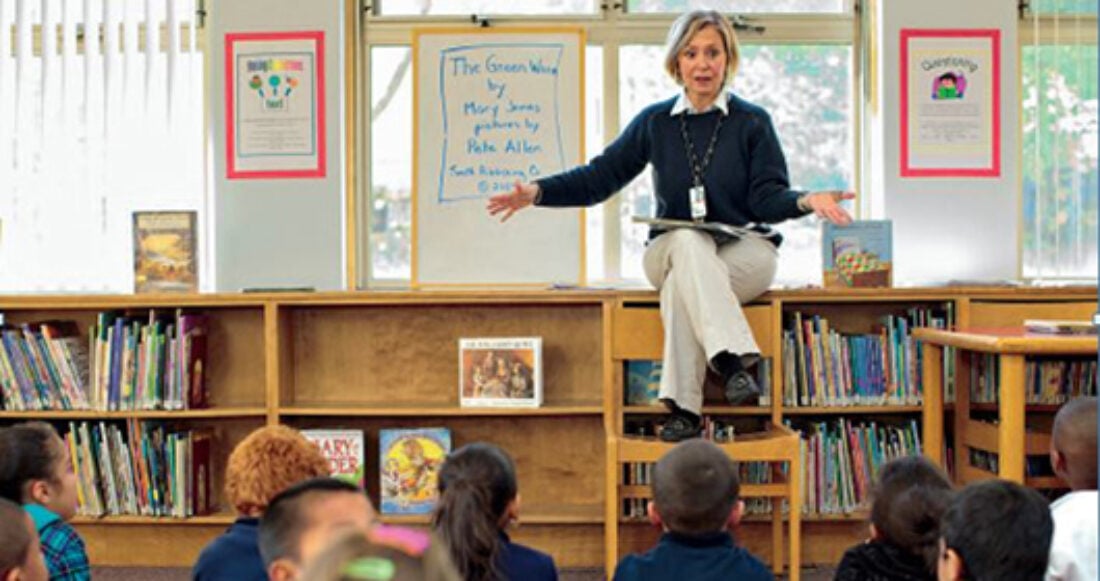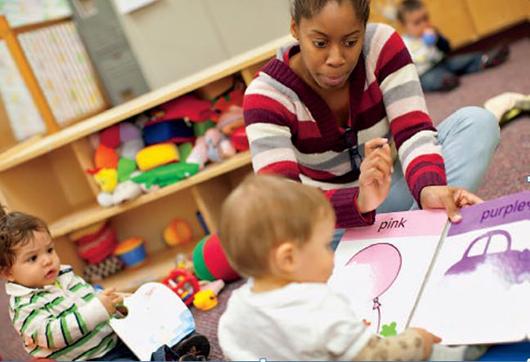Connecticut City Launches Local Campaign for Grade-Level Reading

At the YWCA in New Britain, Connecticut, a city of 70,000 near Hartford, young children’s play groups revolve around early literacy activities that build language skills and introduce young children to concepts of print. Parents can take English as a second language, literacy, and GED classes while their children are in care and then spend time sharing stories with their infants, toddlers, and preschoolers using brightly illustrated texts.
Such scenes have become more commonplace since the YWCA, with the help of other local organizations, opened a family literacy center and created training programs to help parents foster language and reading skills in their children.
Boosting children’s literacy skills to ensure that they are reading at grade level by the end of third grade is the goal of a unique partnership in New Britain between community organizations, private foundations, the school system, and state agencies to get more children on track to achieve reading proficiency, and, ultimately, school success.
By coordinating services and supports for children from birth to age eight, the New Britain Campaign for Grade-Level Reading is looking to boost the district’s third-grade reading scores, which are the lowest in the state. The local initiative, which receives Annie E. Casey Foundation support, is a first step in a larger statewide effort and reflects the goals of a multi-state campaign to ensure that more children are reading at grade level by the end of third grade. It is also among the nation’s first to rally an entire community to take action early to ensure that all children become proficient readers.
“It is a momentous occasion that an entire community would say we care so much about our kids that we will do whatever it takes to get them to this goal that we know makes such a difference,” says Casey’s Executive Vice President Ralph Smith. “Grade-level reading by the end of third grade is a powerful proxy for what we need to do to put all children on the path to academic success.”
For many children in the New Britain public schools, the road to academic success is a bumpy ride. By the time they get to third grade, less than one-fifth meet grade-level goals on state reading tests, putting them at risk of repeating a grade, acting out, and dropping out. As in many other cities and towns across the state and the nation, economic hardship and family challenges prevent many children from reaching the developmental milestones essential to academic achievement.
Even more-affluent districts are looking to improve performance by ensuring that the youngest children are on the right path. The 144,000-student Montgomery County, Maryland, school system, a high-performing district that has a few dozen high-poverty schools, was able to garner the political will and resources to boost achievement for all students. The district has identified what students need to know, beginning in preschool, to become college ready. It revamped its curriculum and instituted assessments, starting with the youngest students, to help identify those who are struggling and provide interventions to get them on track.
In New Britain, the Campaign for Grade-Level Reading “is an important step for this city, because we all know that education is the key to a prosperous future,” Jim Horan, executive director of the Connecticut Association of Human Services, said at a news conference announcing the initiative. The association is the Casey Foundation’s Connecticut KIDS COUNT grantee. “We have a long way to go to close the reading gap and improve literacy for New Britain’s children,” Horan said.

A KIDS COUNT special report released by the Casey Foundation last May, Early Warning! Why Reading by the End of Third Grade Matters, says achieving reading proficiency by the end of third grade is critical because that is when the emphasis shifts “from learning to read to reading to learn.”
The report says the reading achievement gap starts early for children who may not have access to the essential conditions for learning: “good health; having the support of a strong family; feeling safe; and having positive social interaction skills, language skills, the motivation to learn, emotional and behavioral self-control, and physical skills and capacities.”
The report offers four recommendations for improving reading achievement:
- Develop a coherent system of early care and education from birth through third grade;
- Provide the tools and supports to help parents, families, and caregivers in their role as a child’s first teacher, best coach, and most concerned advocate;
- Ensure that all children have access to high-quality educational opportunities that raise expectations for student outcomes and close the achievement gap; and
- Develop and deploy practical and scalable solutions to the contributors to underachievement, like chronic absence from school and summer learning loss.
The principles laid out in the KIDS COUNT report have been endorsed by the Campaign for Grade-Level Reading, a concerted effort to mobilize philanthropic leadership around moving the needle on third-grade reading over the next decade. The campaign includes nearly 60 foundations in 27 states. Casey and a small group of funders that are taking the lead are working to launch the campaign to:
- Close the gap in reading achievement that separates many low-income students from their peers;
- Raise the bar for reading proficiency so that all students are assessed by world-class standards; and
- Ensure that all children, especially those from low income families, have an equitable opportunity to meet those high standards.
More than two-thirds of the nation’s fourth graders and 83 percent of those considered low income could not demonstrate proficiency in reading, according to the 2009 National Assessment of Educational Progress.
In New Britain, the percentages of students in grades three through eight who meet grade-level goals on state reading, writing, and math tests are among the lowest in the state. The district’s high school graduation rate is 70 percent, compared to 92 percent statewide, and about one in four students fails to graduate within four years.
Multiple factors contribute to this crisis. Nearly 72 percent of school-age children in the district qualify for free and reduced-price school meals. Three-fourths of the students are minority, nearly 16 percent are not fluent in English, and 14 percent are identified for special education services.
“There isn’t one simple cause for the problem, or a simple solution. This is more than the schools and families can solve on their own,” says Merrill Gay, executive director of the New Britain Early Childhood Collaborative, which has launched an initiative to increase the availability of high-quality early care and education programs and train parents to be effective advocates.
Over the next two years, the New Britain Campaign for Grade-Level Reading will design and begin to implement strategies—both inside the school system and throughout the community—to raise third-grade reading achievement.
Casey and a group of Connecticut funders, including the William Caspar Graustein Memorial Fund in Hamden, the Children’s Fund of Connecticut, and the State Department of Education, have pledged $500,000 annually to the effort over the next two years. The Connecticut Center for School Change in Hartford will provide technical support to the district on early literacy development.
“We believe that the active engagement of parents, in particular those whose children will benefit the most, and the support of the whole community will bring about sustained change,” says David Née, executive director of the William Caspar Graustein Memorial Fund.






